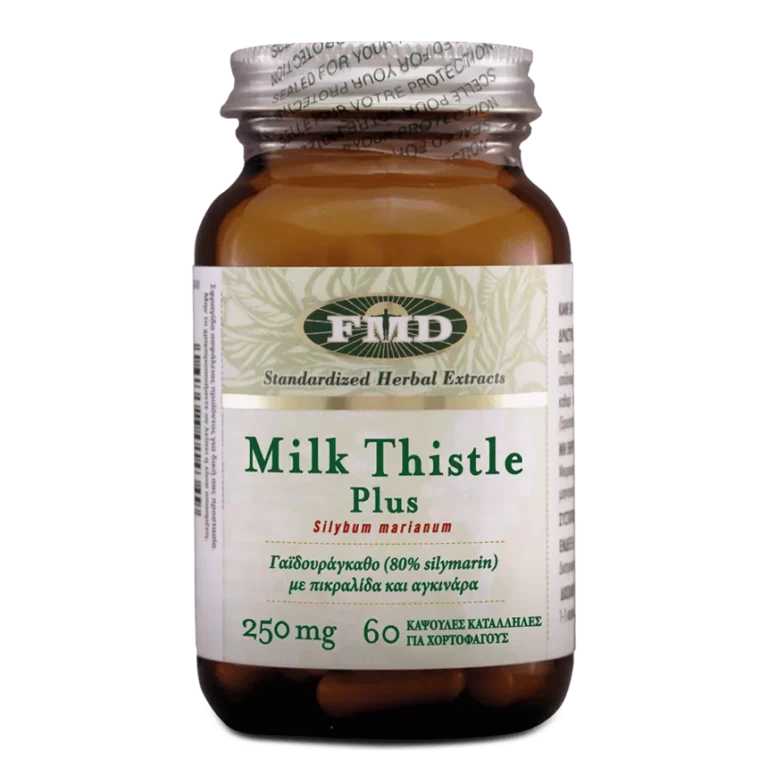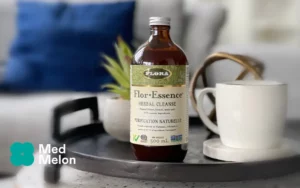Scientific Names of Milk Thistle: Silybum marianum (L.) GAERTN. [Fam. Asteraceae]
Forms:
Crushed milk thistle seeds; milk thistle seed extract standardized for silymarin
Traditional Usage:
– Addiction-related Disorders
– Alcoholism-related Disorders
– Amanita Poisoning
– Anorexia/Appetite Loss
– Anti-inflammatory
– Antioxidant
– Bile Deficiency
– Cellular Regeneration
– Cleansing
– Death-Cap Mushroom Poisoning
– Detoxifying
– Digestive Disorders
– Dyspepsia
– Fatty Deposits in Organs
– Gastrointestinal Disorders
– Headaches
– Hormone Imbalances
– Poisoning
– Spasms
– Toxin Exposure
Overview:
Milk Thistle, Silybum marianum (L.) GAERTN. [Fam. Asteraceae], is a tall biennial plant growing up to 1.5meters. Milk thistle is most well known for its ability to prevent death in death cap mushroom poisoning cases. Many Poison Control Centers across Europe carry the extract for this purpose. In Amanita poisoning, silibinin dramatically reduces death rates from 30 to 50% down to less than 10%. In the 1890s and early 1900s, pharmacies across the U.S. also carried the extract for treating digestive organ congestion with fatty deposits and toxins. Milk thistle has been used as a medicine since early Greco-Roman times, particularly for supporting the liver in detoxifying the blood. Through its bitter properties, milk thistle increases the flow of gastric juices relieving dyspepsia, indigestion and headaches associated with detoxification organ congestion. The German Pharmacopoeia recognizes milk thistle crushed seeds for treating digestive disorders and standardized extracts for preventing and treating damage to the body from poisons and toxins, and as supportive treatment in chronic inflammation of the detoxification organs. Based on double-blind placebo controlled trials, milk thistle seed extract improves symptoms of virally induced organ damage including nausea, weakness, appetite loss, fatigue and pain, and also prevents damage from pharmaceutical drugs. A double-blind placebo-controlled trial following 146 people with organ damage for 3 to 6 years found that for the treated group, the 4-year survival rate was 58% as compared to only 38% in the placebo group. Another controlled study following 106 people with alcoholic organ damage over a period of 4 weeks showed a significant decrease in elevated liver enzymes and improvements in cell health as evaluated by biopsy. Another controlled trial with 172 people with organ damage found a significant reduction in mortality over 4 years. A 2-year study showed no lifespan benefits, suggesting long-term use is required.
Active Ingredients:
Milk thistle seed contains: 1.5-3% silymarin, which includes a mixture of several flavonolignans. The main active ingredient is silybin, otherwise known as silibinin, silychristin and silydianin and related derivatives. Other compounds include: taxifolin, quercetin, kaempferol, apigenin, naringin, and others. The seeds contain 20-30% fixed oil with a high proportion of linoleic acid (ca. 60%) and oleic acid (ca. 30%) and Palmitic acid (ca. 9%). The seeds also contain approximately 25-30% protein; mucilage; 0.04% tocopherol; 0.6% sterols including cholesterol, campesterol, stigmasterol and sitosterol.
Suggested Amount:
Standardized milk thistle seed extract products are recommended with a dosage of 400-500mg daily for 6 to 8 weeks followed by a reduction to 200-300mg daily. Long-term therapy with the higher dosages may be required in serious or chronic cases. Crushed seed, rarely used today, is generally taken as an herbal tea three to four times per day. As an aromatic bitter, a cup of the unsweetened tea is drunk half-an-hour before meals. German authorities recommend using 3-5g of the crushed seed per cup of tea (1 teaspoon of milk thistle seed weighs approximately 3.5 grams). It is recommended that boiling water be poured over the powdered seeds, or alternatively that cold water is added to the seed material and brought to the boil and after 20-30 minutes strained.
Drug Interactions:
Use of milk thistle extract may lower blood glucose levels in diabetics and interfere with existing hypo- or hyperglycemia therapy, therefore careful monitoring of blood glucose levels is required in these cases. Hypoglycemic drugs include: insulin, Glucophage(R) metformin, DiaBeta(R) Glynase(R) glyburide, Glucotrol(R) glipizide).
Contraindications:
Use of milk thistle extract may lower blood glucose levels in diabetics and interfere with existing hypo- or hyperglycemia therapy, therefore careful monitoring of blood glucose levels is required in these cases. Milk thistle is considered safe for use during pregnancy and has a long history of use by nursing mothers.
Side Effects:
No side effects have been reported during clinical trials with standardized extracts. Milk thistle products may produce a mild laxative effect in some people due to stimulating effects on bile secretion. Use of milk thistle extract may also lower blood glucose levels.
References:
Ferenci P, Dragosics B, Dittrich H, Frank H, Benda L, Lochs H, Meryn S, Base W, Schneider B. 1989. Randomized controlled trial of silymarin treatment in patients with cirrhosis of the liver. J Hepatol. 1989 Jul; 9(1): 105-13.
Flora K, Hahn M, Rosen H, Benner K. 1998. Milk thistle (Silybum marianum) for the therapy of liver disease. Am J Gastroenterol. 1998 Feb; 93(2): 139-43. Review.
Magliulo E, Gagliardi B, Fiori GP. 1978. Results of a double blind study on the effect of silymarin in the treatment of acute viral hepatitis, carried out at two medical centres [translated from German]. Med Klin. 1978; 73(28-29): 1060-1065.
Wichtl M (ed). 1994. Cardui mariae fructus – Milk Thistle fruit (English translation by Norman Grainger Bisset). In Herbal Drugs and Phyto-pharmaceuticals. CRC Press, Stuttgart, pp. 121-123.
Zi X, Zhang J, Agarwal R, Pollak M. 2000. Silibinin up-regulates insulin-like growth factor-binding protein 3 expression and inhibits proliferation of androgen-independent prostate cancer cells. Cancer Res. 2000 Oct 15; 60(20): 5617-20.





